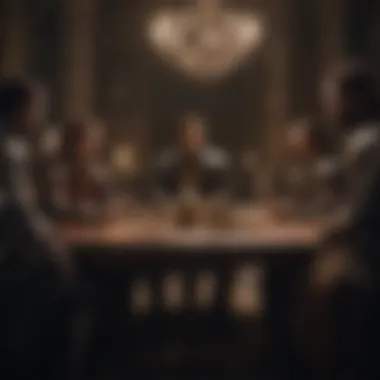Exploring Masculinity in the Houses of Game of Thrones


Intro
In the world of Game of Thrones, the dynamics of power, family, and culture are often illustrated through male characters. This analysis of men within various houses reveals how they contribute to and influence their environments. Each male figure serves a distinct role that often shapes their household's fate and, by extension, the larger narrative of Westeros. As we dig deeper into their motivations and actions, we can better understand the portrayal of masculinity in this saga.
Character Dissections
Detailed Analysis of Key Characters
The male characters in Game of Thrones are diverse, ranging from noble lords to cunning schemers. Eddard Stark embodies honor and integrity, qualities that guide his decisions. His commitment to family and justice places him at the heart of the Stark household. Conversely, characters like Petyr Baelish demonstrate ambition and manipulation. Baelish's backstory reveals a man driven by love, ultimately leading him to pursue power at any cost.
Character Development Throughout the Series
As the seasons progress, character arcs deepen. Jon Snow starts as the bastard son of Ned Stark, burdened by his status. His journey from the Night’s Watch to a leader of men showcases growth. He learns about honor, sacrifice, and leadership. Similarly, Jaime Lannister transitions from the arrogant knight to a more complex figure, wrestling with his identity and morality.
Impact on the Overarching Storyline
These characters not only contribute to their houses but also affect the overall plot. The decisions made by men like Robert Baratheon and Tywin Lannister have far-reaching consequences. Their quest for power often leads to conflict, reshaping alliances and rivalries in the realm.
Masculinity in Game of Thrones
The depiction of masculinity in Game of Thrones is multifaceted. Characters display a range of traits associated with masculinity: bravery, cunning, ruthlessness, and vulnerability. These qualities clash and coexist, providing a nuanced portrayal. The struggles faced by these male figures highlight the complexities of gender roles in a patriarchal society.
"The show does not present masculinity as monolithic. Instead, it invites viewers to rethink traditional narratives around male power and its impact on relationships and society."
Closure
In summary, the roles of men in Game of Thrones serve as a vital lens through which viewers can explore themes of power, loyalty, and identity. By examining individual characters and their development, we gain insight into the broader socio-political fabric of Westeros. This narrative inspires reflection on the portrayal of masculinity and its implications on the unfolding drama.
Intro to Gender Roles in Game of Thrones
Understanding gender roles in Game of Thrones is crucial for grasping the series' narrative depth and character development. The show does not merely present male and female characters as static figures but rather explores the complexities of their roles within the socio-political framework of Westeros. Each male character embodies unique qualities, motivations, and flaws, influencing their houses and the world around them. This section explores how masculinity is defined and portrayed, impacting the series' overall themes and character arcs.
Defining Gender within Westeros
The concept of gender in Westeros is steeped in tradition and power dynamics. In this world, men typically occupy dominant positions, wielding authority and establishing rules. The perception of masculinity often associates it with bravery, aggressiveness, and emotional restraint. Characters are often measured against these traditional ideals, resulting in diverse approaches to leadership, loyalty, and personal identity.
Interactions between male and female characters reveal a spectrum of gender expectations. While women such as Cersei Lannister or Daenerys Targaryen also navigate power, they often do so within a framework defined by male perspectives. Men, therefore, play integral roles not just in their own narratives but also in the stories of female characters, influencing their paths through various alliances and conflicts.
The Significance of Houses
The houses in Game of Thrones serve as microcosms for examining the roles of men. Each house has its ethos, traditions, and expectations that shape the actions and identities of its male members.
- House Stark: Known for its honor and integrity, its male figures, like Eddard Stark, embody loyalty and ethical duty.
- House Lannister: With its wealth and ambition, male characters such as Tywin and Jaime Lannister represent a different approach, marked by manipulation and power struggles.
- House Targaryen: The historical legacy and the burden of past glories significantly influence men like Aegon and Daenerys, reflecting the weight of expectations.
- House Greyjoy: Emphasizing a harsh, survivalist mentality, men like Balon and Theon illustrate how a focus on strength can lead to both restoration and downfall.
- House Tyrell: Here, the intersection of wealth and political strategy highlights how characters like Mace Tyrell navigate power through both cunning and charm.
Ultimately, the significance of these houses lies in their ability to shape and reflect male identity in Westeros. Each household serves as a backdrop against which individual stories unfold, reinforcing or challenging the existing gender norms. We see how the men’s values and actions within their respective houses contribute to the larger tapestry of power dynamics in the realm.
Overview of Key Houses


Understanding the key houses in Game of Thrones is crucial. Each house represents distinct values, beliefs, and styles of leadership. This section focuses on the male figures within these houses, detailing how they shape the political landscape and social norms in Westeros.
Male characters are often the face of these dynasties, embodying their principles and driving their agendas. They are central to discussions of power, honor, and loyalty. The conflicts and alliances between houses hinge greatly on the actions and decisions made by these men. Consequently, studying the dynamics within each house enables us to grasp how masculinity is portrayed and its broader implications.
House Stark
House Stark is synonymous with honor and duty. The male members, particularly Eddard Stark and his children, define the house's identity. Eddard Stark embodies the principles of loyalty, integrity, and sacrifice. His unwavering commitment to his family and the North influences the broader narrative significantly. His values stand in stark contrast to the deceitful politics in Westeros.
Jon Snow, although a Stark by blood, faces the outsider's struggle. His path from a legitimate heir to the Night's Watch demonstrates how the Stark ethos can foster resilience. His character development illustrates the adaptability of Stark values in an unforgiving world. The dynamics within House Stark showcase how masculinity entails both vulnerability and strength.
House Lannister
House Lannister exemplifies power and ambition. Tywin Lannister, the head of the house, is a master manipulator. His ruthless political strategies underscore the darker side of masculinity, where intellect and cruelty coexist. Tywin’s influence shapes not just House Lannister but also the fate of the Seven Kingdoms.
Jaime Lannister presents a more complex portrayal of masculinity. Initially perceived as a villain, his character arc reveals layers of conflict regarding identity and honor. Jaime’s struggle with his reputation and values ultimately challenges common perceptions of masculinity. Together, these characters illustrate the multifaceted nature of power within House Lannister.
House Targaryen
For House Targaryen, the theme of legacy is pivotal. Men like Aegon and Daenerys grapple with their heritage and the heavy burden it carries. The notion of being a Targaryen infuses their actions and decisions with a sense of destiny and conflict. Their ties to dragons symbolize both power and destruction, embodying how masculinity is tied to legacy and expectation.
This house also reflects on the consequences of obsession and instability. Characters like Viserys Targaryen reveal how the pursuit of power can lead to ruin. Targaryen masculinity thus becomes an exploration of both strength and vulnerability, demonstrating its inherent contradictions.
House Greyjoy
Among the Greyjoys, masculinity is deeply intertwined with themes of independence and rebellion. Balon Greyjoy's emphasis on strength fosters a culture that values dominance over diplomacy. This rugged portrayal of manhood leads to a harsh interpretation of loyalty and honor. The conflict between the ideals of the Iron Islands and the rest of Westeros expresses how masculinity can diverge dramatically across cultural lines.
The character of Theon Greyjoy highlights the struggle for acceptance within this rough framework. His journey illustrates the complexities of masculinity, particularly under the enormous pressure of family expectations. The dynamics of House Greyjoy thus serve as a commentary on how identity is shaped by both familial and societal expectations.
House Tyrell
House Tyrell's approach to masculinity is unique, whereby traditional power strategies blend with political charm. Figures like Mace Tyrell emphasize the importance of alliances and negotiation over conflict. This perspective contrasts sharply with the more aggressive approaches from Houses Lannister or Greyjoy.
Olenna Tyrell, while a woman, holds significant power in guiding her family's interests, showcasing that influence can transcend gender. The male figures in this house, therefore, navigate spaces where cleverness often prevails over brute force. Their masculinity is characterized by adaptability and intellect, distinguishing House Tyrell from others within the narrative.
This variety of representation among the male characters not only enhances the understanding of Game of Thrones but also invites reflections on modern masculinity. Each house offers a different lens through which we can analyze the roles men play in power structures, consequently shaping the overarching story.
Influential Male Characters and Their Houses
In the narrative tapestry of Game of Thrones, influential male characters embody the complex interplay of ambition, honor, and power. Their actions shape not just their personal stories but also the fates of entire houses within Westeros. This section scrutinizes five pivotal figures, examining how their motivations and decisions impact the overarching themes of masculinity, leadership, and morality. Understanding these characters sheds light on the intricate dynamics of power and loyalty that drive the plot forward.
Eddard Stark: The Honor Code
Eddard Stark stands as a pillar of integrity within Game of Thrones. His commitment to the honor code forms the backbone of his character. As the Lord of Winterfell, Eddard embodies the ideals of justice and duty, influencing his children and bannermen with his steadfast principles.
His ultimate demise illustrates the harsh consequences of adhering strictly to honor in a world rife with deceit and treachery. Eddard's unwavering moral compass, while noble, also serves as a cautionary tale about the vulnerabilities inherent in such a perspective. He is often seen as a tragic hero, reflecting the broader challenges men face when balancing honor with survival in the brutal political landscape of Westeros.
Jon Snow: The Outsider's Perspective
Jon Snow, raised as a bastard, represents the outsider's viewpoint throughout the series. His journey from the Night's Watch to the leadership of the North speaks to the themes of identity and acceptance. Jon's growth showcases how strength can come from perceived weakness.


Through his experiences, he confronts notions of legitimacy and personal worth. Jon's character development emphasizes the importance of loyalty and courage, demonstrating that true leadership often arises from empathy and understanding, rather than traditional power dynamics. His willingness to question authority and forge alliances positions him as a crucial player in the struggle against larger threats.
Tywin Lannister: Power and Manipulation
Tywin Lannister epitomizes shrewd political acumen and ruthless ambition. As the head of House Lannister, his every decision is calculated for maximum advantage. Tywin's ability to manipulate events behind the scenes highlights the darker side of masculinity, characterized by cunning and control.
His belief in the necessity of power over emotional connections shapes his relationships with his children, particularly Jaime and Cersei. Tywin teaches that dominance often comes at the cost of personal relationships. His untimely death creates a power vacuum that demonstrates both his influence and the fragility of control in the ever-shifting political landscape.
Jaime Lannister: Redefining Personal Identity
Jaime Lannister’s character arc invites a reevaluation of identity and redemption. Initially viewed as the embodiment of arrogance and dishonor, Jaime's journey reveals layers of complexity. His struggles with his reputation and relationships, particularly with Brienne of Tarth, foster a transformation from a brash warrior to a more reflective figure.
Jaime's evolution underscores the theme of personal sacrifice for love and honor. His character challenges the traditional conception of masculinity, suggesting vulnerability can coexist with strength. By the series' conclusion, his quest for redemption greatly humanizes him, reflecting the potential for redefinition far beyond societal expectations.
Petyr Baelish: The Puppet Master
Petyr Baelish, commonly known as Littlefinger, navigates the treacherous waters of Westeros with a singular talent for manipulation. His cunning strategies and relentless pursuit of power position him as a master of chaos. Petyr’s motivations are deeply rooted in personal ambition, often obscured by his affectation of loyalty and love.
His role as a puppet master illustrates the capacity for men to wield influence through intelligence rather than brute strength. Littlefinger's machinations create ripple effects that alter allegiances and provoke violence. This portrayal compels viewers to reflect on the nature of ambition and its capacity to corrupt, reminding us that the thirst for power can lead to unexpected and dire consequences.
Masculinity and Power Dynamics
The portrayal of masculinity within Game of Thrones serves as an essential lens through which to understand the power dynamics that shape the narrative. Men in the series often occupy positions of authority, influence, and responsibility, which are not merely title-driven but deeply interwoven with their identities and societal expectations. This exploration allows us to see the complexity of male characters, as their actions and decisions frequently revolve around notions of power, honor, and societal obligations. Understanding these dynamics is critical, as it not only informs the audience's perception of male characters but also underlies larger themes of loyalty, ambition, and moral conflict that run throughout the story.
Male Leadership Roles
Male leadership in Game of Thrones is characterized by various styles and motivations, ranging from noble to tyrannical. For instance, Eddard Stark exemplifies traditional leadership rooted in honor and ethics. In contrast, figures like Tywin Lannister wield power through manipulation and fear. This contrast is not merely superficial; it reflects deeper cultural attitudes towards masculinity and leadership.
- Honor and Honor-bound Leadership:
Eddard Stark exemplifies the noble warrior archetype. His decisions often stem from a moral code that prioritizes family and justice. - Manipulation and Control:
On the other hand, Tywin Lannister’s leadership is defined by strategic cruelty and ruthless ambition. This highlights a pragmatic approach to power, where emotional detachment allows for more calculated decisions.
This blend of honor, pragmatism, and ruthlessness presents a nuanced understanding of how leadership shapes not only individual fates but the destinies of their houses and the broader kingdom.
Allegiances and Betrayals
In a world dominated by shifting alliances, allegiances in Game of Thrones often reveal the fragile nature of power. Trust becomes a commodity, frequently traded and often discarded. Male characters are faced with choices that test their loyalties. This is seen in the relationships between Robert Baratheon and his former friends or in the betrayals within the Stark family.
- Shifting Loyalty:
The political landscape is constantly changing, making it essential for characters to adapt their allegiances. Allowing emotions to guide these decisions often leads to tragic outcomes. - Betrayal as a Tool:
Betrayal is often viewed as a strategic maneuver in the series, reflecting the harsh realities of political life. Characters like Petyr Baelish skillfully exploit these betrayals to achieve their ambitions.
This dynamic of allegiances and betrayals contributes immensely to the narrative tension. Viewers witness the consequences of misplaced trust, adding depth to the characters’ identities and motivations.
Sustainability of Power
Sustainability of power within Game of Thrones raises questions about the true nature of strength. Simply obtaining power does not ensure its duration; maintaining it requires constant vigilance and adaptability.
- Cunning versus Force:
Many males in positions of power rely on wit rather than brute strength to maintain their hold. For instance, characters like Tyrion Lannister demonstrate that intelligence can wield significant power, often more effectively than sheer physical might. - Adapting to Change:
The series illustrates that those who cannot adapt to the changing landscape—whether socially, politically, or emotionally—often find their power dwindling. The fall of House Stark after Eddard’s death exemplifies this struggle.
Ultimately, the dynamics of masculinity within Game of Thrones reveal profound insights into how power is constructed, challenged, and upheld. As the story unfolds, it becomes evident that the interplay between masculinity and dynamics of power is vital in shaping not only individual characters but the fate of entire houses.
The Emotional Landscape of Men


The emotional landscape of men in Game of Thrones is a layered and intricate topic. While the series delves into power struggles and honor codes predominantly, it also uncovers how emotions shape male characters and their decisions. Understanding this landscape is vital for several reasons. First, it allows viewers to appreciate the internal conflicts that men face amidst the treacherous world of Westeros. Second, it highlights how vulnerabilities can contrast sharply with traditional expectations of masculinity. Finally, it shows that emotional depth among male characters often drives their actions, affecting family and political dynamics within their houses.
Expressions of Vulnerability
Throughout the series, men express vulnerability in ways that challenge the idea of traditional stoicism. Characters such as Jon Snow and Jaime Lannister are not immune to feelings of doubt or despair. Jon’s struggle with his identity and belonging is palpable. He often grapples with being a Stark and a Snow, which fuels his emotional turmoil. On multiple occasions, his tears reveal a depth to his character that transcends mere warrior bravado.
Similarly, Jaime provides another example of vulnerability that challenges gender norms. His emotional journey is one of richness as he transitions from the cocky knight to a more complex figure who confronts his past mistakes. His care for his family, especially Cersei and Tyrion, reveals how personal bonds shape his actions.
"In a world where strength is everything, it’s the moments of weakness that define one’s true character."
This emotional complexity signifies that vulnerability, far from being a weakness, often marks a pivotal point in male character development. The ability to feel, reflect, and even weep allows these characters to forge connections, sometimes resulting in unexpected alliances or tragic downfalls.
Family Bonds and Loyalty
Family bonds play a central role in shaping male characters across the series. Many are driven by a fierce loyalty to their houses and kin. For example, Eddard Stark exemplifies the archetype of a family leader deeply rooted in his familial duties. His commitment to honor and family loyalty eventually leads to his tragic fate. Consequently, his virtue becomes a hallmark of the Stark legacy, influencing his children profoundly.
Furthermore, the bond between brothers also emerges as a significant theme. Tyrion Lannister's complicated relationship with Jaime showcases how loyalty to family can conflict with personal morality. Throughout the series, loyalty often leads to moments of intense drama. These instances reveal that male characters are shaped not only by their individual desires but also by their loyalties to their families.
The portrayal of familial ties emphasizes the emotional stakes in the show. When a character prioritizes family loyalty, they expose vulnerabilities, showing how deeply emotions can intertwine with power and survival in a world dominated by brutality. It becomes evident that while the politics of Westeros is a central theme, the emotional ties of family play an equally crucial role in defining the actions and legacy of its male figures.
Contrast with Female Roles
Understanding the contrast between male and female roles in Game of Thrones is essential for examining how gender dynamics operate within the story. The series showcases a range of female characters who defy the typical gender expectations of a patriarchal society. Women in power often experience unique challenges that their male counterparts do not face; thus, exploring this contrast reveals much about the societal structures at play in Westeros. The interplay between male and female dynamics is crucial to the complexity of the narrative.
Women in Power and Influence
In Game of Thrones, women like Cersei Lannister and Daenerys Targaryen significantly reshape traditional power narratives. Cersei navigates a male-dominated political landscape, often using manipulation and cunning. Her rise to power illustrates how women can wield influence by leveraging the very systems that seek to marginalize them. Daenerys, on the other hand, embodies the idea of breaking chains and defying oppresion through strength and charisma. She transitions from a vulnerable position to a formidable leader, commanding armies and striving for justice.
- Cersei Lannister: Uses cunning to navigate male-dominated politics.
- Daenerys Targaryen: Transitions from victim to powerful leader.
Both characters exhibit resilience in the face of societal constraints, making them pivotal examples of female influence. Their stories serve not only as contrasts to the male characters but also as reflections of the power struggles experienced by women in various roles throughout the series.
Comparative Analysis of Male and Female Dynamics
The analysis of male and female dynamics in Game of Thrones highlights contrasting methods of achieving influence and power. Male characters often utilize brute force or legacy to assert control, while female characters frequently rely on emotional intelligence and strategic thinking. For instance, while Tywin Lannister’s authority rests upon his status and military might, characters like Sansa Stark show growth through understanding people and forming alliances.
- Male Dynamics:
- Female Dynamics:
- Rely on strength and fear.
- Legacy and military might are key factors.
- Use emotional intelligence and networking.
- Personal relationships form the bedrock of their influence.
This comparative analysis does not diminish the power of male characters but rather contextualizes their roles within a specific framework. When observing how male figures often approach power compared to female characters, it becomes clear that differing strategies emerge based on gendered experiences and societal expectations. Understanding these distinctions contributes to a richer interpretation of the series' themes and character arcs.
Closure: The Legacy of Masculinity in Game of Thrones
The examination of masculinity within the context of Game of Thrones reveals significant insights into character development and narrative progression. This conclusion synthesizes the various elements discussed throughout the article and illustrates how male representation shapes the story's landscape. To understand legacy of masculinity in this series, it is essential to consider the multifaceted roles these male characters play. They serve not only as leaders but also as complex individuals who navigate emotional conflicts, familial duties, and the harsh realities of power dynamics in Westeros. Their actions and decisions often drive the plot, showing how masculinity interweaves with themes of honor, loyalty, and ambition.
Implications for the Series and Beyond
The implications of masculinity in Game of Thrones extend beyond mere character analysis. The portrayal of men in power resonates with societal views on masculinity and authority. Characters like Tywin Lannister and Jon Snow exemplify how male figures can wield significant influence, but also face moral dilemmas that question their understanding of power. Considerations of their legacy prompt viewers to reflect on contemporary discussions about gender roles and leadership. The series invites us to reevaluate traditional male archetypes, revealing the strengths and vulnerabilities inherent in their portrayal.
Final Thoughts on Male Representation
Male representation in Game of Thrones serves as a lens through which we can analyze broader cultural narratives. By examining the evolution of characters such as Jaime Lannister from a brutish warrior to a man confronting his emotions, we see a shift in the depiction of masculinity. This resilience allows for a deeper understanding of the male experience beyond stereotypes. The series provides a vivid tableau of how men operate within family structures, societal expectations, and the quest for power. Ultimately, it challenges audiences to acknowledge the complexity of masculinity, prompting discussions that continue to be relevant today.



